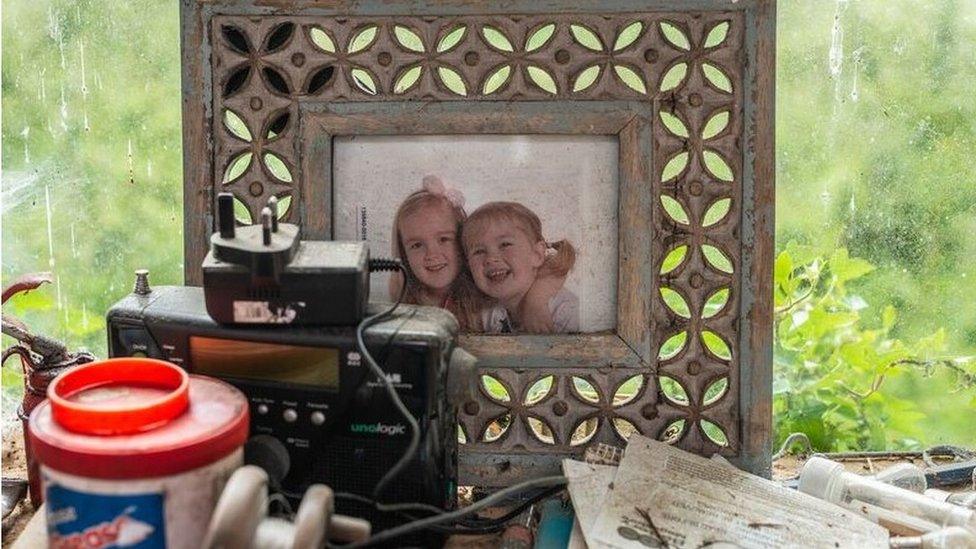The day my friend stopped me walking into the sea
- Published
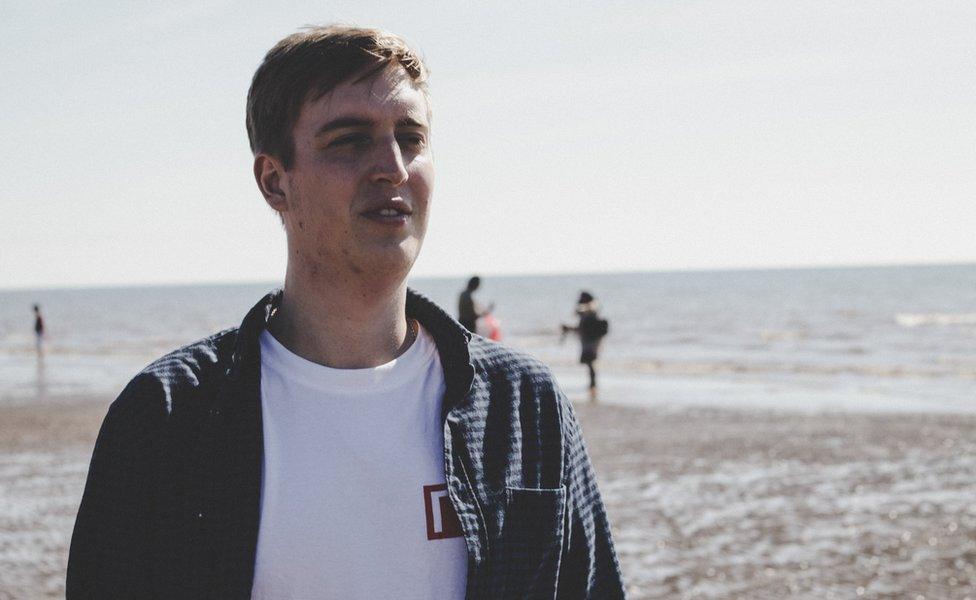

Mark Newsome is in the sea when his best mate Will rings.
He answers.
"Mate," Will shouts into the phone. "What are you doing?"
The cold water is at Mark's knees. He's taken his trainers, socks and jeans off. He wasn't planning on coming back out.
"Blackpool?" says Will.
"What a shit place to die."
Mark wades slowly back to the beach and sees a police officer walking towards him.

Will's words saved Mark's life on that sunny Sunday last July.
Now Mark, 28, is using them as the title of his one-man show about the time he hit rock bottom - and came back from the brink.
He's already performed three sold-out shows in Manchester and will be in Camden, north London, next week.
Even if the show, which he describes as a dark comedy, helps just one person to open up about mental health and suicide he'll be happy.
"I don't want people to think the title is what I think of Blackpool - it's just tongue in cheek.
"It's not a play about Blackpool, it's a play about mental health."
Allow YouTube content?
This article contains content provided by Google YouTube. We ask for your permission before anything is loaded, as they may be using cookies and other technologies. You may want to read Google’s cookie policy, external and privacy policy, external before accepting. To view this content choose ‘accept and continue’.
It's hard to understand why he - or why anyone - would want to relive the hardest day of their life on stage every night in front of a room full of strangers.
To understand, it's best to go back to the beginning.
I sang Tom Jones's Sexbomb and it changed everything
Mark was always an introvert.
School in his hometown of Oldham, Greater Manchester, was hard going for him.
He spent break-times on his own and found making friends really hard. What he didn't know then was that he had Asperger's, a form of autism that can make connecting with people difficult.
One day, when he was 10, he entered his school's "Stars in Their Eyes" talent contest.
He sang Tom Jones's Sexbomb.
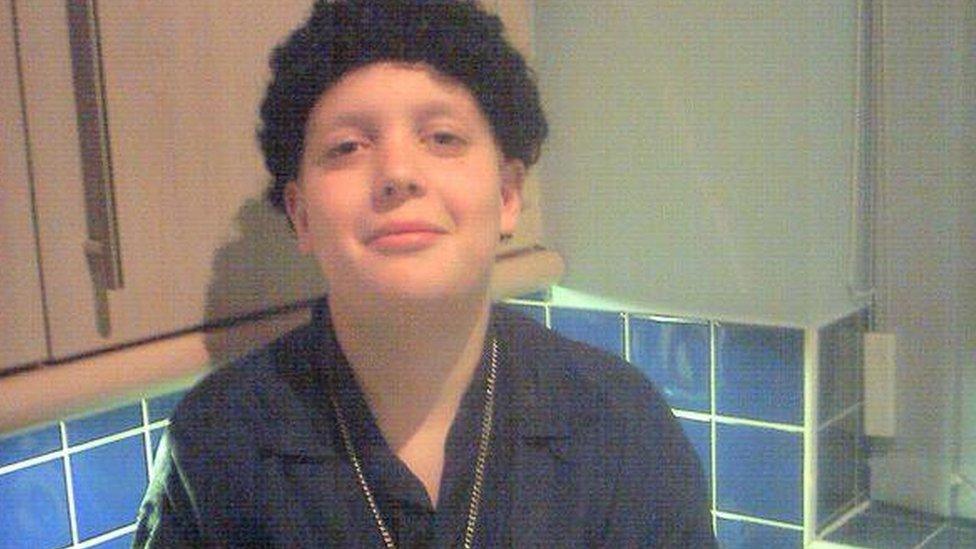
Mark as Tom Jones

He won it.
"It was absolutely amazing. All of a sudden everyone wanted to be my friend. It was like acceptance for the first time," says Mark.
"I had this burst of 'I love this - I want to be doing something like this with my life'."
I was outed in Asda
Later, at 15, he joined Oldham Theatre Workshop. "They saved me, really, that organisation. Because they really believed in me and I was accepted. I knew I couldn't do anything else but act."
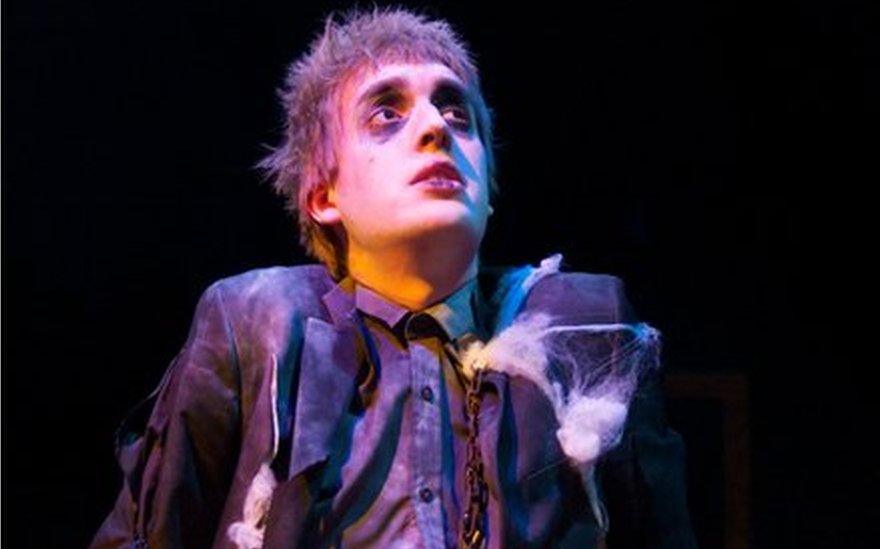
Performing in A Christmas Carol

Looking back now, Mark says he always struggled with his mental health - but moving back to his home town after three years at the Royal Welsh College of Music & Drama in Cardiff sparked a loneliness and depression like never before.
Mark had come out as gay to his university friends but struggled with the idea of telling his family.
"I got outed [to my family] at Asda. One of my sister's friends said 'Your brother is gay' - that's how my family found out."
His family were very supportive but Mark's depression continued to worsen and he began binge drinking.
"I would drink as much as I could, as cheaply as possible, and then I would go out and drink more. Then I'd start to feel shit so I'd take drugs - cocaine or ecstasy - to get myself back up."
The next day he'd always feel even worse.
I'm going to go to Blackpool
Breaking point came after a rough year and a devastating row at a family barbecue.
The row, which related to Mark's sexuality, spilled into the streets and the police were called.
He got a lift into town in a police car. Then he went out all night.
He charged his phone in a pub at 8.30am. He just didn't want to go home.
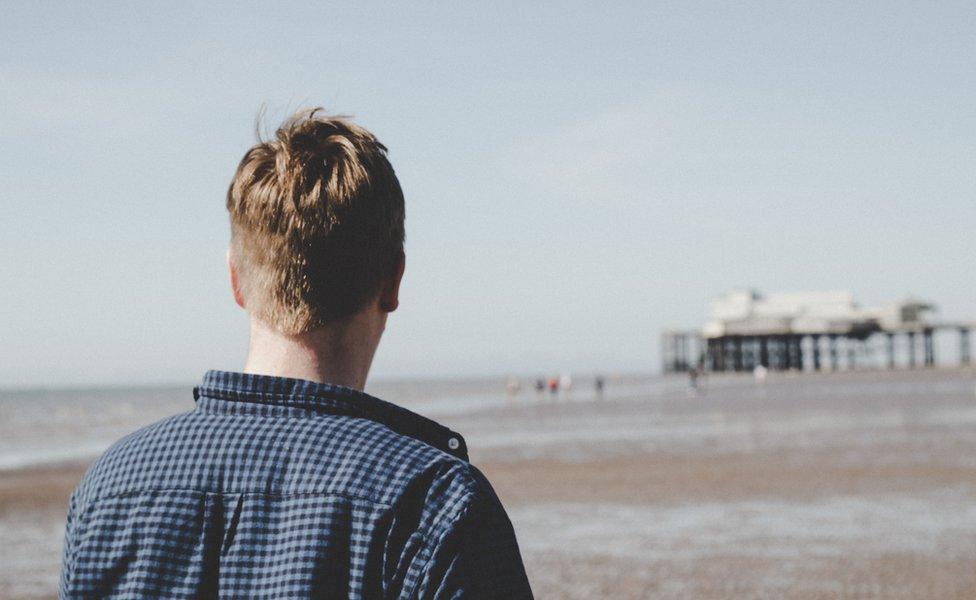
Mark returned to Blackpool earlier this year

"It was then that I started to feel suicidal. I felt so claustrophobic.
"I went to Manchester Piccadilly. I saw Blackpool on the board and I just thought: 'That's where I'll go. I'm going to go to Blackpool'."
Mark took two trains. He hadn't bought a ticket but after persuading station staff to let him through the gates he headed for McDonald's.
"I sat in there for about an hour and just started to cry. A woman came up and asked if I was ok and gave me a cup of tea."
I wrote a Facebook post saying goodbye
Mark left McDonald's and walked on to the beach.
He thought about what to do next.
"It was a really nice day. It was very sunny and the tide was quite far out. I could see families being really happy and playing together, but I had never felt so alone in my life."
He wrote a Facebook post saying goodbye to friends and family.
He took off his trainers, socks and jeans but kept hold of his mobile. As he walked, concerned messages began pinging to his phone.
"I didn't know what to do. I felt so lost and empty inside."
He kept walking.
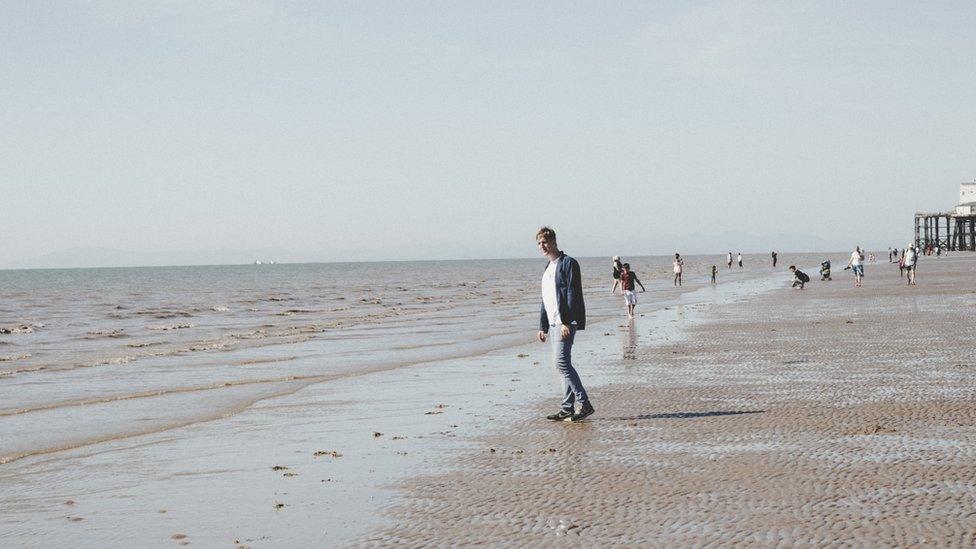
He was nervous about going back but said it brought back happy memories of childhood trips

When he was up to his knees his mum rang and begged him to come home. After talking for a few minutes he hung up.
He was now knee-high in the water. Will rang.
"He just kept speaking and I was listening to him. I couldn't really talk at that point, he was just comforting me. He said: 'I don't want you to go because I'll miss our conversations'. I started to cry. He said: 'Come on, you're stronger than this'."
It was at that point Will uttered the words that made him step out of the sea.
"Blackpool, what a shit place to die."
Police took him back to the prom. After that it's a bit of a blur.
He remembers a police officer buying him a sandwich out of her own money. He remembers hugging his mum.

Where to go if you need help
If you, or someone you know, is struggling, you can find support here.

Since that day Mark has been on anti-depressants and in and out of therapy.
"I have good days and bad days. It never goes away, you just learn to deal with it."
People began to tell Mark to write his own story. After meeting writer and journalist Phil Pearson they hatched the idea in a small cafe in Oldham of a one-man show.
They met at the same place each week, at Parliament Square Cafe, and slowly but surely the play took shape.
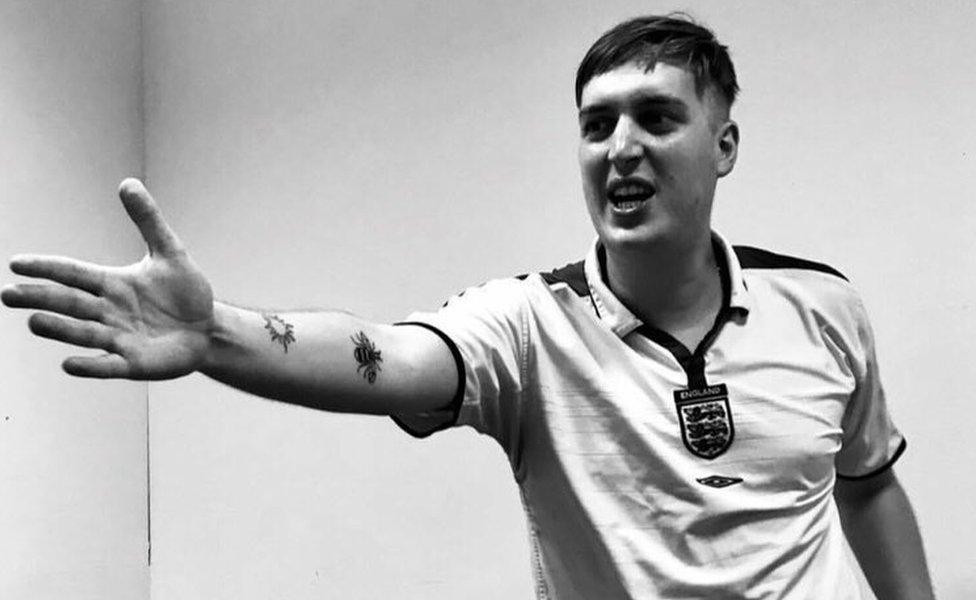
Mark rehearsing for his play

The show is in three acts. Mark plays Billy Costello, who he describes as "the darker side of me - all of my bad traits".
It focuses on what happened in Blackpool but also looks at Mark's childhood and present, flitting between the two and at times talking directly to the audience.
"I really love performing it. It's quite therapeutic. I don't find it difficult at all. I'm a very honest and open person who's never found it hard expressing my feelings. I wear my heart on my sleeve...
"But I am reliving it every time I do it. I have to feel those emotions and go back to those places."
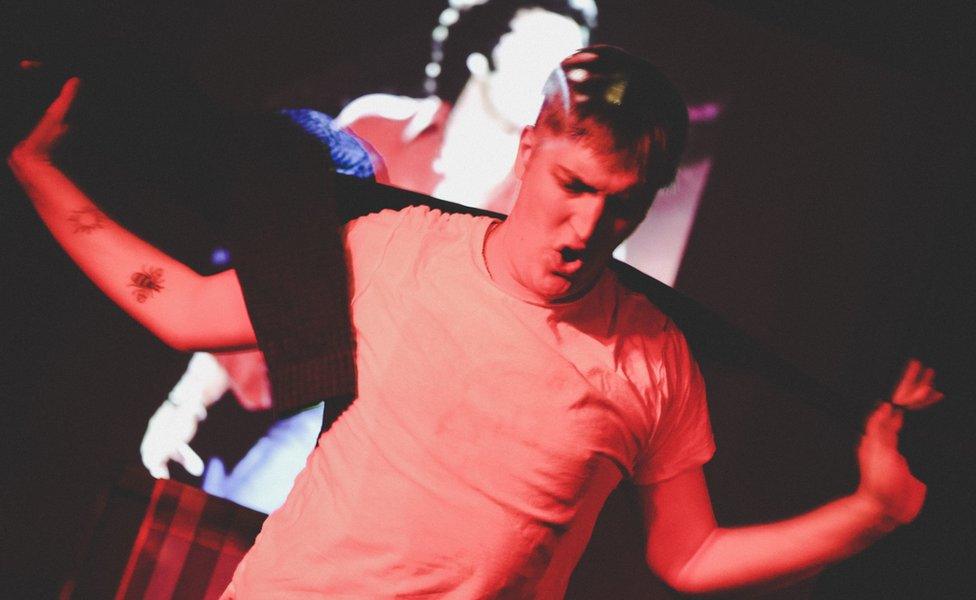
Performing in the show in Manchester

If you can just reach out to just one person
Mark says he originally did the show "selfishly, to help me through my recovery" because "when I'm doing something creative that's when I'm alive and that's me".
"But this is more than just a play... People are coming up to me and saying 'Oh my god, that was amazing, it really touched me, it was really emotional and it reminded me of so-and-so'.
"If I can come on stage and share my story and people connect with it, and they understand a bit better about mental health, then that's an amazing achievement."

You might also like...

He says he wants people to know it's a real story - his story - so they know they're not alone.
Although the rate of male suicide is falling in the UK, men still account for three-quarters of suicides.
"I think men feel like it all has to be bottled up, like a stereotypical man thing. You have to be strong and carry on, don't let your emotions get to you. But often men don't want to talk about it, and it comes to a point where it gets quite extreme."
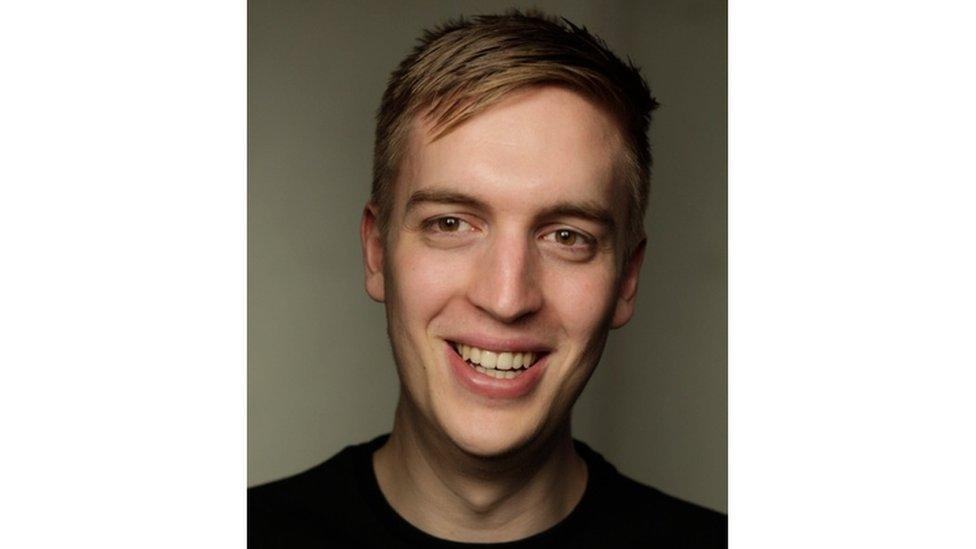
Mark says it's important to talk and there's absolutely no shame in it.
"Don't keep it to yourself.
"If you can reach out to one person - and don't feel you're a burden - people will want to help you, they will want to listen to you...
"That person could save your life."
- Published4 August 2018
